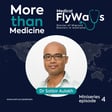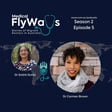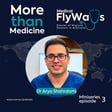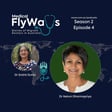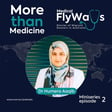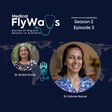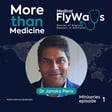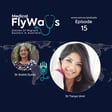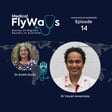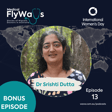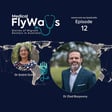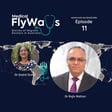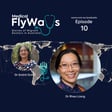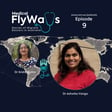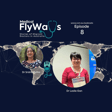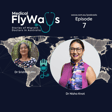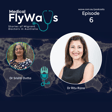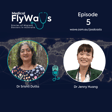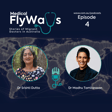Become a Creator today!Start creating today - Share your story with the world!
Start for free
00:00:00
00:00:01

Series 1 Episode 1: Dr Farnoush Nia
In our first episode, Dr Srishti Dutta speaks to Dr Farnoush Nia, Iranian-trained GP and GP supervisor, brings her eight years of experience working in Tehran to Melbourne, where she focuses on women’s and children’s health. Alongside her clinical work, she writes about her experiences and supports International Medical Graduates through RACGP.
Have a doctor whose story should be heard on Medical FlyWays?
Email marketing@wave.com.au to let us know.
Recommended
Transcript
Introduction of Farnush and Migrant Doctor Journey
00:00:01
Speaker
Medical Flyways, the untold journeys of migrant doctors in Australia.
00:00:13
Speaker
Welcome, Farnush. As we would say on some social media pages, the Queen has arrived. Thanks for having me. Thank you so much for being part of this. The podcast was mainly to bring you and share a different perspective about your journey as well as the journey of others who may have come from Iran.
Reasons Behind Farnush's Migration
00:00:34
Speaker
But I'm sure we'll touch on many other aspects as well.
00:00:37
Speaker
So first question, I suppose, you know, Australia is one of several developed countries that doctors migrate to. So as an example, I first went to the UK before coming to Australia. What do you think attracted you to Australia? And was there a particular person or experience that influenced that decision?
00:00:58
Speaker
True. So I didn't really know much about Australia or about any particular person, to be honest, I got to the stage that I had, I was a GP back in Iran, I graduated in 2004. So I immigrated to Australia in 2012, it was eight years of
00:01:17
Speaker
pure general practice experience in Iran. I had a four-year-old daughter. I was just working in clinic, which was only for general practice. I had actually really stability in my job and in my finances.
00:01:34
Speaker
I never intended to actually migrate. I really wanted to be close to my family. We are a very small family of only one boy and a girl, only me and my brother. So I was really thinking of staying next to my family. But I got to the stage that I felt that the government was unfortunately limiting my career prospects.
00:01:58
Speaker
And then I thought about my daughter, who was four at the time. And I'm not sure if you know what women face in Iran. So there are a lot of discrimination in law and in practice in relation to marriage, in relation to divorce, inheritance, child custody, nationality, international travel, about work. So unless you're really connected to the government, you can't really reach to
00:02:27
Speaker
your potentials, you can't really get to what you feel you can get.
Migrating with Family vs. Alone
00:02:32
Speaker
And the other thing is general practice is not really respected there. So people basically just go and see there's like a specialist if they have even with a common cold or sinusitis, they will just see and I think this is basically what's threatening general practice in Australia because
00:02:53
Speaker
it doesn't actually have a very good outlook. But anyway, I decided to immigrate at the time. And I don't say I did it only for my daughter because I did it also for myself because... Oh, I love that comment. Yeah, I know a lot of people say, well, I immigrated for my kids. I don't know why I should say I didn't immigrate for myself because I did.
00:03:14
Speaker
But then we decided to immigrate. It was 2012, and we just looked into some countries, and I thought, well, Australia, they speak English, so we received some exams. Let's just go there. At the time, my brother went to America. He's still there. But I chose to come to Australia, and I don't regret that decision now.
00:03:38
Speaker
Thank you for your honesty. We all do things for ourselves and we do, of course, factor our kids in, but it is primarily for ourselves at the time. Now, I know that both yourself and your husband and your daughter came over. I mean, certainly from my perspective, when I moved, I was single. And the logistics of things are very different if you move as a family as opposed to as a single person.
Early Challenges in Australia
00:04:01
Speaker
Were there things that you researched? Were there things that you looked up?
00:04:05
Speaker
before you decided where you were going to work in Australia? Did you have much of a choice in that matter? Look, I think this is the funny part of it. I didn't really know much. There are a lot of restrictions on the internet and social media in Iran, so you basically need to be on a VPN to access to any social media and even on Google.
00:04:27
Speaker
There are a lot of restrictions, so you don't basically know a lot before you go. I didn't really know any doctor who had immigrated to Australia, and I didn't even know what Facebook is before 2012, before I came to Australia. I didn't even know what it is. So when we decided to come, we had a lawyer who just guarded through this that, like, this is the prospect of, like, what happens? Like, what happens if you go to this country or to the other country?
00:04:55
Speaker
I really felt that general practice is respected in Australia. That's a different thing we will talk about later, if that's the case. But this is what I thought at the time. I had a four-year-old daughter. I thought that this is what's going to be. So I will just start looking for a job and then
00:05:15
Speaker
like this is what we will do, so both of us. It was a much harder journey when we came over, mind you, but at the time it didn't look that difficult. At the time I was just thinking that I'm putting behind a very stable job and a very stable life behind to come to Australia for better aspects and for more human and women rights in Australia. This is what I came for. I didn't come for
00:05:45
Speaker
any financial issues or these sort of things. Those were all okay in my life. It is interesting when your phrase is like that, and I probably will wholeheartedly agree that I think many of us have made the journey because there is a better prospect for physical safety, physical movement, and even just simply equal access and opportunity as women.
00:06:14
Speaker
So, that itself offsets any other financial benefits that one might see.
IMG Work Conditions and Legal Challenges
00:06:23
Speaker
So, completely agree. I do think that living in India, we had better access to information. So, the level of restrictions to that aren't comparable in any way. The challenges sound familiar, is what I'll say.
00:06:38
Speaker
And like you, I have two daughters. So I think I'm quite happy with my decision of having moved as well. So when we were discussing questions, one of my colleagues suggested that I should definitely ask how you balance your work as a GP with that of being a wife and a mom. Are there any special tips and tricks and secrets? Or how do you do it all?
00:07:05
Speaker
Look, I think it's quite different when I came to Australia. I might just say what happened when we came in. So when we came in for about four or five years, and I mind you, I still didn't have really access to the social media. I didn't really know how a GP life is in Australia. I didn't really know how everyone else does it. So I thought this is quite normal. So when we came, we had a course for the, I think it was the
00:07:33
Speaker
clinical course at the Monash University. So through that lawyer we had a house and then we had booked ourselves in that course. Now Monash University is at the very east and what that lawyer had booked for us to live in was in a very, very west. So we had like two hours going through public transport just to get to the Monash University and every time we would
00:07:58
Speaker
reached there they would just tell us oh my god you're just you're late all the time and all the professors are really fed up with you we don't know why you're always late and we used to keep our four-year-old daughter in the pram and she would just watch like Tom and Jerry all the you know cartoons and everything on the phone until we finished that eight hours course and we were always late because it was two hours public transport in Australia that we didn't really know how to get
00:08:28
Speaker
So anyway, after finishing that I was just trying to look for a job and I just found a job.
00:08:36
Speaker
in a clinic and it wasn't really my best experience in Australia but I think a lot of people have heard or read about my experience but it was just a very abusive employer-employee relationship at the time although it was just supposed to be like a contractor but I was actually an employee but it was like a lot of abusive things. I used to put my daughter
00:09:02
Speaker
in the so there was like the clinic was like double story and I used to put my daughter upstairs to sleep and we used to work after hours from like six till 11 and I would just carry her home at 11 o'clock and in the morning I would just wake up at eight o'clock because the practice manager and the principal would just call me about things that happened the night before like this patient went to radiology there's no appointment what shall she do
00:09:30
Speaker
this, you know, blood pressure medication is, you know, there was a lot of things. So it was like, I was just working 24 seven, but it was like an after hours job. So we didn't get like any day off or anything during that five years, because they said, if you take any day off, you have to pay another low conductor to come and work instead of you. So, and we thought like that this is how it is, you know,
Finding Support and Advocacy
00:09:58
Speaker
surely if you go on a day off, like,
00:10:00
Speaker
anything, you have to just pay someone else to come and work because you're causing convenience to the clinic you're working at. We didn't really know. It is not how it is. We didn't know that you might be subject to like pay label, sick leave or anything. Like I remember I had abdominal pain at some stage and then I kept working, working at 11 o'clock. It was just getting bad and I said, well,
00:10:25
Speaker
Let's take some Panadol. Let's just continue working. So I worked on the bath. We went home at about three o'clock. It was just getting too much. So I woke up my husband and I said, well, I think we need to go to hospital. So we went and it was appendicitis. So I had appendectomy and I got a call from practice manager. When are you coming back? Because we're not paying someone else to come. So I got back to work the next day.
00:10:51
Speaker
Oh, dear. Yeah. Or, for example, if my daughter was sick, she would just, they said, well, give her Panadol, come back to work, anything. Dude needs to come back to work. So I think what you're saying is you were so isolated that you didn't have a way of knowing, you know, like it was just the two of you. That's exactly right. Yeah. And I think this is what is putting all the IMGs at risk to be really isolated.
00:11:18
Speaker
This is really, really risky because you will just accept whatever you're told and you think these are facts. This is how things are in Australia.
00:11:29
Speaker
Think about then, and you consider what's happening or where we are now. Do you think, because I often wonder, our own individual experiences can be subjective as well. If someone asks you, can you explain the Australian system to me? Show me where it exists.
00:11:48
Speaker
I was asked that recently and I still can't think of any particular resource or any particular place where I would send someone to have a look at to say this is where you understand everything.
00:12:01
Speaker
Like I know the IMG group have IMG's pathway has been published, which is information. But what you're talking about is rights and responsibilities, right? Like what are my rights and responsibilities and what are my employer's rights and responsibilities or my sponsor's rights and responsibilities. But it's just the contract which seems to be the information for it.
00:12:29
Speaker
Well my contract was just a half a page contract and it just said like this is what you will get and this is
00:12:39
Speaker
I think things are a little bit better now as in there is the supervisor and there is like a medical educator and there is like a college looking into things so you have better resources to sometimes check with others if this is normal like when I started working I didn't even know so I started unlimited registration so I didn't even know that
00:13:03
Speaker
Limited registration means I have to work through fellowship because my supervisor told me you cannot sit fellowship exams for 10 years.
Support Groups for Female GPs
00:13:14
Speaker
So this is what I was told. You know, if you have a second person to tell you, this is what it means. You're unlimited registration going through fellowship and you have to try for two years. I didn't even sit for fellowship exams because I didn't know I was supposed to. I was told you're not supposed to do it for 10 years. So at what point did you start to not trust what you were being told?
00:13:40
Speaker
Look, it actually took a long time, as I said, because the main priority for me was to make sure that my daughter and my family, they're in good place. Because we got to the stage that my opera registration was confirmed. I had a provider number.
00:13:59
Speaker
I didn't have, my supervisor still didn't want me to work because he didn't ever have an IMG working and he was nervous about it. No matter how good you are or whatever, he was just nervous about it. And I had only $200 in my bank account. So, and I had to pay rent with that.
00:14:19
Speaker
So I get to the stage that I told him, look, I really have to start working. I've had my registration for a couple of months. Let me work. Let me at least work during the time you're here. Trust me. And then he got really angry saying, what do you mean? Trust me. I don't really, I can't really do that. I'm not going to court for you.
00:14:40
Speaker
So it was just like all really complicated. I think what happened was after about three, four years of working there, when things are getting a little bit too difficult on me, and I was just thinking, well, I don't really think this is the usual in Australia, because this is really a real abuse and this is really harassment.
00:15:02
Speaker
And for the first time I joined Facebook. And it's funny because I joined Facebook and then I joined a page that you know GP's down under. And then I said, well, I just joined and this is my story. Is this normal? And then everyone was like, no, no, no, that's not normal. What are you talking about? And I said, well, I've been working like this for four years. Is this how it's supposed to be? Can I sit exams? Can I do anything? Is there a way out?
00:15:32
Speaker
And I'm actually really grateful for that. You know, although there are a lot of controversial things, but it was actually a bailout for me because I was really, really isolated.
00:15:44
Speaker
I was the only IMG in that clinic. I didn't get any support. There was no medical educator. There was no higher supervision on what's happening to me. I think I got to this stage that, well, look, just go. You can do the exams, do this, do that. So anyway, I think that was a way out for me. I set my exam. I got my fellowship.
00:16:12
Speaker
which I didn't really know I can attend. But yeah, there was a lot of challenges for me. And you have not looked back one bit because I can think of lots of things in terms of successes that I can mention. I saw you during the COVID campaign, such a staunch advocate for people from diverse backgrounds. I know you did a lot of work in your clinic, but you were on the media.
00:16:38
Speaker
It was fantastic because I think there was some negative commentary around Melbourne and culturally and linguistically diverse communities and why people were felt not to be following the rules and regulations and it was really good to see someone from the community stand up for that.
00:16:56
Speaker
more i can tell you know those people they actually did what they were told at a time or was there like we were just a clinic that i was working at at a time was just in front of a tadpole college and i can tell you that as soon as you know it was out and people were told this is what you have to do they all followed the regulations so i can't really say there was any problem but yeah i can understand there was a lot of distress at the time and
00:17:25
Speaker
you know all everything would affect everyone if there was any restrictions it would affect everyone but I understand that but at the time I think everyone was doing the right thing
00:17:37
Speaker
Oh, I think I definitely noticed that yourself, and there were a few other GPs in Melbourne that were clearly community leaders. And yeah, I think it makes a difference. I think it matters when you, as a GP, say this community is trying their best as well. So I think you've done really well since the initial challenges. Now, what prompted Crispies, if I can ask? Because I cannot mention it.
00:18:06
Speaker
What do you think led you to kind of, I suppose, initiate it? So, I think you've already read my post on GPs and under hashtag live as far news. I have indeed. I believe there's a book coming. Is there a book? Well, I have so one day. Okay, I'll look out for it. I'm just heading to that. Yeah, sure.
00:18:27
Speaker
But look, I think you agree that humor improves productivity, reduces stress, it prevents burnouts, it provides motivation. It has done all for me. Like this is how I actually go through life. It has, whenever things are a little bit stressful for me, I always think that like that aspect has, it actually had an ironic aspect to it.
00:18:56
Speaker
and it helps me to cope. So I think what happened one day was on another Facebook group on GP's mom, someone asked if there's a group for burnt out GPs and what do we do if we're really feeling burnt out and if things are getting really, really too much. And I said, well, at the moment it's only me, but I can make a group and just make us two.
Ongoing Advocacy and Reflections on Iran
00:19:25
Speaker
And then I made a group and it was the two of us. And then there were a lot of other people who wanted to join. And before you know it, yeah, you've got four figures. Yeah, absolutely. Yeah, we're just trying to, you know, the thing for female GPs is that I don't really think they have to suffer in silence. And I think everyone should agree that, you know, things are a little bit
00:19:52
Speaker
more difficult for female GPs and this is just all different to the gender pay gap. That is a totally different thing. So I think, you know,
00:20:02
Speaker
Any challenges in GP practice, either it is that the patient complaints and the anger and the discrimination, the sexual harassment, the bullying, the threats of violence, anything that can cause extreme distress, I think female GPs will feel it more.
00:20:23
Speaker
And they usually get that compassion fatigue as well. So I think it is just good to have a very small group that we see you. This is how I feel and this is how all of us feel and to support each other.
00:20:38
Speaker
I completely agree. I think the group has got a very strong sense of empathy, and you can disagree, but everybody feels their distress or even concerns not always in distress, validated by their peers. And also, I think it helps people frame solutions in a better frame of mind, as opposed to where if you're posting something and you're
00:21:02
Speaker
feeling like your lived experience is being denied, you're never likely to engage with that process any further. So I've certainly had a few good interactions on there, and I'm sure we'll continue to. And I had put that here as a thought about female GPs and how things are different for us. And I do agree with you that it's not just about pay.
00:21:22
Speaker
I think Crispies is fantastic. Thank you. To be honest with you, I had not realized that you had started it until a lot later, but I should have guessed it. I should have. Now, I was going to say, I noticed that on your bio, there's a few special interests, women's health, pediatrics. Now, were these things that you had a special interest in even before you came to Australia? Yes, I did. I did a few courses in that. So you transferred that over here?
00:21:51
Speaker
That's right. Yeah. And, you know, there are a lot of restrictions on LGBTQ community back in Iran. So I'm not sure if you know about the regulations, but it is basically a crime there. And I still was, you know, helping and supporting the community in a very, very, you have to do it in a very, very secret way. Yeah. Unfortunately, this is how it is. You have to do it in a very secret way that yourself
00:22:19
Speaker
supporting them and you can do whatever you're doing whatever you can for them but at any stage any of the authorities know both of you are gone both in you know life and career so i was still doing it back home and i'm still doing it here and it is one of the things that i'm really proud of that i can now do it freely here instead of doing it in that
00:22:45
Speaker
It's really fascinating I can't remember the name of the female doctor she's a believe she works in canes or far north queens and obstetrician and gynecologist and I was listening to a podcast and she talks about the time when she was a medical student in Ireland and we're talking about a time when you and I were not born.
00:23:04
Speaker
And she used to, I believe the official term is smuggle. You try and contraceptive devices from the UK to Ireland to one of her professors who said, if you're a medical student and you get these for me, you won't get deregistered because you're a medical student. But if I get caught, I will lose my license. So it sounds like some of us are just chosen to push the boundaries and keep doing it over and over again.
00:23:30
Speaker
So, hats off to you. And I guess I was wondering if there are doctors in Iran now, are they likely to be in the same position in terms of having limited access to information? I think they still do. Yeah, the ones that I have, I'm in contact with, they still are. And they always ask me, like, what's happening? What do media say about us?
00:23:54
Speaker
This is what happened. Even a lot of things like abortion or even contraception is now very restricted back in Iran. They don't really support contraception or abortion, which is a big part of women's health.
00:24:12
Speaker
So even if there is any major congenital issues or anything that you might tell the patient, you can't even do that because then the patient might consider abortion and then the only person who is actually in trouble is a doctor. So you do what you can. I did what I can and I know my colleagues and I'm proud of them. And I think things will one day change, definitely.
00:24:40
Speaker
It hasn't ended. It is an ongoing thing. It's a revolution in mind and it's a revolution that will happen in real life. And you know, we've had like, they have detained over 20,000 protesters and killed more than 500 for all these things. But this is your mind. This is something they can't stop.
00:25:02
Speaker
They can't stop the brain. They can't suppress all thinking. Absolutely. They can't. I was going to ask you something on the back of that. Is there anything that you have left behind that you still think you miss? I left behind my family. I left behind my mom and dad.
00:25:20
Speaker
When I got married, and that was 17 years ago, and I never thought I'm going to immigrate or anything because I thought, well, I'm going to fight. I'm going to make things the way I like. I said to my husband, I can only live two streets away from my parents.
00:25:40
Speaker
because this is how we are attached and we can't release as far as I will go. He said, okay, that's what we will do. That's all right if that's what makes you happy. Because I have only one brother and he is in the US. So I thought this is the first I can go and he said, all right. Well, now I have my parents. I actually did meet my parents after four years.
00:26:04
Speaker
I had two kids during this time, and they never saw me pregnant. They never saw my kids being infants. If I talk about it, it doesn't really sound much, but to me, I think it was a lot of sacrifice. I am having goosebumps here listening to that. I don't know that your words will not make people realize what you just described.
00:26:29
Speaker
No, thank you. I think to me it was a lot of sacrifice that, for example, when I was working here during COVID and like the seven years thing that you watched on media, it was at a time that I was pregnant with my kids. And like this is when my parents saw me because being pregnant and this is what I was so attached to them. So this is what I left behind.
00:26:56
Speaker
And I think, you know, it's like a very large tree that even if you come, your roots are still behind. So I can never say that I totally came because this is where my heart was and I still really feel connected to my parents, to my country. But you have to sometimes at some stage do some choices and I did them for my family, myself and my daughter.
Language Barriers and Discrimination
00:27:20
Speaker
Yes, we make peace with the choices we make, but I absolutely hear you, and I think maybe I didn't expect to ask you that question, but I knew in my mind there was a lot coming up, so I felt the need to ask. I'll be seeing my parents and grandparents, hopefully after four and a half years at the end of this year. That's nice. I had one other question. I met a lovely, lovely doctor from Iran, Fehreshteh is her name.
00:27:49
Speaker
I remember saying to her, that means spirit or angel. She said, how do you know that? I said, well, Persian Urdu and Hindi have a lot of common words. That was us. I met her on the first day of a two-day training that was organized by Health Workforce Queensland because we were both going to work in rural area, so they'd organized this two-day induction for us.
00:28:16
Speaker
Which I thought was great given that neither of us had any idea about this. This was in 2014. And she mentioned something that I didn't know. So she said that when you are taught medicine in Iran, it's not in English.
00:28:31
Speaker
Is that right? It's stored in Persian, including the textbooks and all of that. So how important is language in that transition from working in Iran to working in Australia?
00:28:47
Speaker
Yeah, it sure is a barrier, that language thing. We do study in Parisian, so everything is in Farsi. Everything is translated, but I had this opportunity that because my father was a pilot and he was actually talking English, it was very important to him for us to learn English. At a time that I went to a primary school, I also was attending English classes.
00:29:13
Speaker
It is something that you have to just do as an add-on and it's like very expensive education if someone else has English classes as well. But it is a barrier for us and I think this is what makes IMGs come from UK a little bit different to other IMGs because first of all, they have English as their language and second of all, they come as a fellow doctor.
00:29:40
Speaker
while other IMGs come as this language barrier and then you will always have your accent and as soon as you talk the patient instead of
00:29:51
Speaker
you know, concentrating on what you're saying, they say, where is that nice accent from? And I said, well, it's from Iran. Now can we just talk about your disease? So it's just that accent stays with us all the time. And the other thing is we usually come on limited registration. So yeah, language is a thing we do, unfortunately, because of
00:30:14
Speaker
all government issues, they don't really promote English language that much at schools. So they want everyone to learn Arabic. Well, we don't really learn Arabic. I can understand when I read and write, like in writing, I can understand the text, but we can't really understand if someone speaks. But English is something that you have to actually put effort in yourself. It's not something that's through school. You have English classes, but it's not really something
00:30:45
Speaker
which has a lot of efforts in. But as I said, I did have this chance of learning English since I was about six or seven. So you would have, even within the cohort of people that came from Iran, would have had some understanding of being conversant and being fluent in English.
00:31:03
Speaker
Yeah, I was, yeah, at the time. And I felt that me being more fluent in English than my husband actually, you know, made things a little bit easier for me. It did make a big difference. But as I said, I still sometimes do get discrimination. Sometimes I do get the questions. But I mean, it's not really something that bothers me because if you have an accent, it means you're speaking another language other than English.
00:31:30
Speaker
And it's an interesting point you make that knowing more than one language is generally in any other profession considered a skill in itself. Somehow we seem to miss that piece altogether. And look, I mean, English is not my first language. And although I think I'm almost thinking in it now, I still find people correcting my English, believe it or not.
00:31:51
Speaker
It's fascinating. And I think I was quite surprised because when they finished, they brought it up. I didn't realize there's so much I don't know about people that I interact with and what their experience has been. Actually, all the medical phrases are more in French than in English.
00:32:07
Speaker
for some reason. So it makes it a little bit difficult when you want to actually think it in English. But more phrases are like the way we are taught are in like French phrases for some reason. So I know that in certain regional training organizations
00:32:25
Speaker
they did have specific support for the trainees for whom English was a second language. And it kind of almost, I almost wondered whether that's something that now that the college has training for everyone. I'm not really sure because I think at the time that people actually get to the college level, they actually need to have either OSU or IELTS at about seven anyway. So they have that, they have passed that stage of, you know, any English support.
00:32:55
Speaker
So I don't really think there is any focus on that from college.
00:32:59
Speaker
Yeah, I agree. So I think it comes into play with things like the CCE exam and, you know, whether there's someone struggling with, I think you make a good point. Rather than making it a blanket, we will make this about language. It's better if the person asks for it and they provide that support. Have you identified that as an individual for the learner? That's far less discriminatory as well, I suspect, rather than sticking the label on all and sundries.
Rapid-Fire Insights and Conclusion
00:33:26
Speaker
Yeah, you've checked my bias there. Thank you.
00:33:29
Speaker
Look, there's this last bit that I call, well, no, not quite last. There's this bit about rapid fire. So I'm going to say three words out to you and you just say whatever comes to your mind first. Okay. Okay. It can be another word. It can be a thought. It can be an emotion, whatever. So happy to go. Yeah, let's go. First one, IMG. They suffer a lot. And it is different to IMGs from UK.
00:33:57
Speaker
there should be different IMGs from UK and none from UK. Okay, there is a hierarchy there is what you're saying. Burnout. You're not alone. Be all experienced that. Share your pain with us. I'm sending you a virtual hug here. Last one, leadership. I think the person who acknowledges how difficult the job is, and
00:34:28
Speaker
how to make it less painful. How to make it real is what you're saying. Yeah, thank you. Now this last part, and you don't have to commit to or say anything here, but I had asked my last guest to recommend or put forward a name or a person for me to interview in a subsequent episode. So do you think you could nominate anyone?
00:34:53
Speaker
or anyone comes to mind. Should it be an IMG? Preferably, yes. We are focusing on that through the podcast at the moment. An IMG and a woman of color, as we say. So someone from a culturally and linguistically diverse background. Maybe Linda Rose. Linda Rose-Reichser. I will reach out to Linda and see how we go. See if she's happy to come on board. Yeah, I think I would like to hear her story on this. Thank you so much.
00:35:27
Speaker
Oh, that's okay. I think you're doing a wonderful job. You were so honest. More than anything else, I appreciate that. Thank you. You're welcome. Thank you so much for having me and giving me this opportunity.
